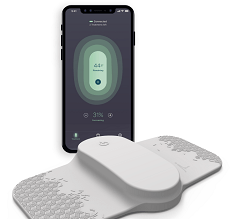
Theranica Bio-electronics has announced positive top-line results in its double-blind, randomised, placebo-controlled, multicentre, pivotal clinical trial in the USA. This trial evaluated the efficacy and safety of Nerivio—a wearable remote electrical neuromodulation (REN) device—for the preventive treatment of migraine in both episodic and chronic migraine patients.
The study met its primary endpoint, demonstrating a statistically significant reduction from baseline in monthly migraine days in patients treated with Nerivio, as compared with a placebo device.
Patients who used Nerivio every other day experienced a reduction of four migraine days per month from baseline, compared to a reduction of 1.3 days in the placebo group (net therapeutic gain of 2.7 days, p<0.0001).
The study further analysed the reduction of monthly migraine days separately for chronic migraine patients, who experienced a reduction of 4.7 days (placebo, 1.6 days; p=0.001), and episodic migraine patients, who experienced a reduction of 3.2 days (placebo, 1 day; p=0.003).
Some 40% of the 248 study participants used concomitant preventive medications, mainly prescribed oral medications, calcitonin gene-related peptide (CGRP) monoclonal antibody injections and Botox injections. Similarly to the general study population, a separate sub-analysis showed a reduction of monthly migraine days over placebo, with a reduction of 3.5 days (placebo, 1.5 days; p=0.03).
Statistically significant superiority of Nerivio over placebo was further demonstrated in other endpoints, a Theranica press release details. These include mean reduction of monthly headache days (reduction of 4.5 days [placebo, 1.8 days; p<0.0001]), and moderate/severe headache days (reduction of 3.8 days [placebo, 2.2 days; p=0.005]), percentage of patients experiencing a reduction of headache days and moderate/severe headache days, mean reduction of acute-medication days (reduction of 3.5 days [placebo, 1.4 days; p=0.001]), and more.
These statistically significant results were obtained both on the entire intent-to-treat (ITT) dataset of 248 patients, as well as the most adherent modified ITT (mITT) dataset of 179 patients. Only one device-related adverse event was reported in the study, which occurred in the placebo group, and was categorised as mild and resolved without intervention, the release notes.
Brian Grosberg (Hartford Healthcare Headache Program, West Hartford, USA), primary investigator of the study, commented: “These data demonstrate Nerivio’s potential to provide a new, non-pharmacological, preventive treatment option for people with migraine. The high efficacy of Nerivio compared to placebo, with favourable safety and tolerability, suggests that REN could be a beneficial non-pharmacological therapy option for both preventive and acute treatment of migraine, subject to FDA [Food and Drug Administration] approval.”
Theranica has submitted this study to the US FDA for an expanded indication to include both preventative and acute migraine treatment, increasing the scope of patients who can be treated with Nerivio, the company also claims.









